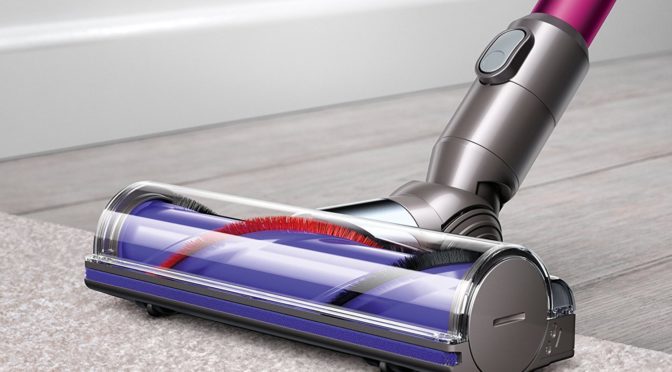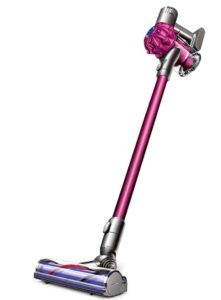
Sometimes in life, it’s more important to get a job done than it is to get it done perfectly. When you’re starving after a long day at work, the last thing you want is a meal that takes 3 hours to prepare. And when you’re juggling a life full of work, kids, pets, and other responsibilities, sometimes you don’t need the full-powered upright or canister to do a good job cleaning the house. A portable or robotic vacuum might get the job done well enough, and sometimes well enough is good enough.
Dyson gets this. It’s why they’ll sell you uprights like the Ball Animal 2 for mega cleaning sessions, handhelds like the V7 Car+Boat for quick touch-ups around the house and minivan, and sticks like the V8 Absolute to let you balance power and portability. We’ve reviewed several cordless vacuums lately, and today we’ll continue with the Dyson V6 Motorhead Cord-Free Vacuum, which we’ll compare to the V7 Motorhead that succeeded it. Our ten second summary is to choose the V7 for more battery life and the V6 for a cheaper price and the option for an even cheaper refurbished version. We fully review it below, and you can buy the new V6 Motorhead here or buy the certified refurbished V6 Motorhead here.
Pros, Cons, and Key Features of the Dyson V6 Motorhead Cordless Vacuum
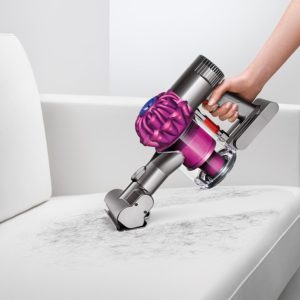
The Dyson V6 Motorhead is a previous-generation Dyson portable that was succeeded by the V7 Motorhead. In the cord-free line (what Dyson calls their high-end portables), currently available models include the V8 Absolute and Animal, the aforementioned V7 Motorhead, and the V6 Absolute, Motorhead, and Cord-free. Dyson also has a low-end line of portables (called “handhelds”) which are distinguished from the cord-free line by lower battery life and the lack of an extension hose to make them work as stick vacuums. The flagship cordless is the V8 Absolute while the top handheld is the V7 Car+Boat.
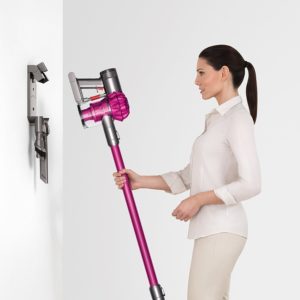
Key features of the V6 Motorhead include a 20 minute battery runtime (12 minutes using the direct driver cleaner head, 6 minutes using max power mode), three cleaning tools, a wall-mounted charging dock, and a 2 year Dyson warranty (which drops to 6 months in the certified refurbished model). The Motorhead weighs 5 pounds on our scale and tops out at 100 airwatts of suction. It can hold .11 gallons of dust in its bin and needs 3.5 hours to recharge the fade-free Lithium-ion battery.
Inside the box, whether new or refurbished, you’ll find the V6 and three cleaning tools–the direct drive cleaner head, which you’ll use the most, the combination tool, and the crevice tool. You’ll also find the docking station for charging and storing your V6.
What’s the difference between the Dyson V6 Motorhead and the V7 Motorhead?
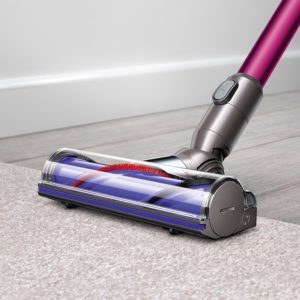
Despite the generation separating them, there are very few differences between the V6 Motorhead and V7. In fact, the only meaningful difference has to do with battery life. You get 20 minutes with the V6 and 30 minutes, or a 50% increase, with the V7. In real world use, this was often the difference between “finishing” a cleaning job and feeling like we’d left something undone (e.g., part of a car interior or bedroom). We also felt the difference when using the motorized head, as battery life there dropped from 19 minutes in the V7 to only 12 minutes in the V6. Interestingly, max power mode remained the same in both models at 6 minutes.
Aside from this difference, nearly everything about both vacuums is identical, including suction power (100 airwatts) and accessories. There is a slight weight difference–the V7 tipped the scales at 5.6 pounds while the V6 weighed in at 5 pounds. Practically speaking, though, you’re only going to notice the difference if you’re using both to vacuum a scale; they feel the same in your hand.
What’s the difference between the V6 Motorhead and the Certified Refurbished version?
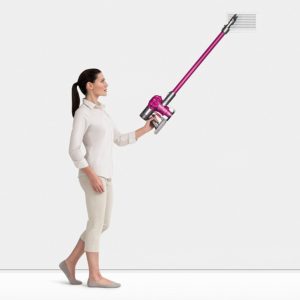
Every now and then, Dyson releases certified refurbished versions of their vacuums to accompany the new versions; it’s a way for them to fix up returned models and re-sell them after restoring them to like-new quality. There are two differences between the brand new Motorhead and the certified refurbished version: price and warranty.
First, the refurbished Motorhead is cheaper. The exact price will vary slightly from day to day, but it’s a good opportunity to save money compared to the brand new model, because the refurb is almost always going to be the cheaper of the two. Second, the refurbished Motorhead is limited to a 6 month warranty instead of the standard 2 year warranty found on the new V6 Motorhead. Everything else about both machines–including the included accessories–is the same.
How well will the Dyson V6 Motorhead keep a home full of kids and pets clean?
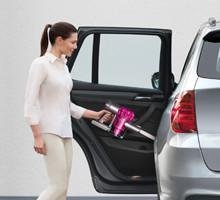
When you buy a cordless or stick vacuum, you need reality-based expectations to be happy with how it cleans. It’s not going to give you Ball Animal 2-like cleaning power for 20 minutes, because it’s not an AC-powered full-sized vacuum that weighs 3 times as much. It’s not going to clean high-pile carpets like a Miele C1 Cat & Dog or Electro+. In fact, it won’t clean them at all. It’s a Dyson, but it’s not going to do the impossible, no matter how much the marketing suggests otherwise.
That said, a high-quality cordless vacuum like the V6 Motorhead should be able to do a lot, including clean dirt, grime, food, and pet hair out of car interiors, off sofas and beds, out of car seats and from behind fridges, and more. In general, while it won’t replace an upright vacuum, it can complement it well–very well. In fact, there are many happy owners of Dyson sticks like the V6 who report leaving their main vacuums in the closet most weeks because it’s just so convenient to use the V6 instead. This matched our experience.
Our main frustrations with the V6 had to do with battery life; we’d have liked the extra 10 minutes built into the V7, but of course, that would have required buying the V7 instead. And that line of thinking is dangerous, as it can easily lead to buying the V8 Absolute, which doubles the V6’s battery life at a full 40 minutes. Practically speaking, once we got used to the 20 minute limit on the V6, we were generally able to make it work. That said, we would like to see the charging time cut beneath 3.5 hours; we found that unnecessarily long, especially in a world where even cheap robotic vacuums like the Shark 750 or 720 are fully charged in 2-3 hours. We know you can do better, Dyson.
Why buy the Dyson V6 Motorhead?
Overall, we feel generally positive about the V6 Motorhead. It can do just about everything the V7 does at the expense of battery life, which is 10 minutes less per charge. That said, if you don’t mind the shorter runtime, you can save money and still get a very capable stick vacuum that will last for years. If you’d like to save even more money, buy the Dyson-refurbished V6; just be aware that along with the price cut, it also has a cut in warranty coverage.
![]() You can buy the Dyson V7 Motorhead here on Amazon. If you don’t need the additional battery life, you can buy the V6 Motorhead here new or buy the certified refurbished V6 here instead.
You can buy the Dyson V7 Motorhead here on Amazon. If you don’t need the additional battery life, you can buy the V6 Motorhead here new or buy the certified refurbished V6 here instead.
![]() Canadians can buy the Dyson V7 Motorhead vacuum here on Amazon; unfortunately, the V6 Motorhead is no longer available.
Canadians can buy the Dyson V7 Motorhead vacuum here on Amazon; unfortunately, the V6 Motorhead is no longer available.
 If you find our research on PMC helpful, you can follow our efforts to keep maniacally reviewing home cleaning tools by shopping through our links above. We promise to keep fighting the good fight against every horror children, animals, and grown, yet messy humans can inflict upon a clean home.
If you find our research on PMC helpful, you can follow our efforts to keep maniacally reviewing home cleaning tools by shopping through our links above. We promise to keep fighting the good fight against every horror children, animals, and grown, yet messy humans can inflict upon a clean home.

